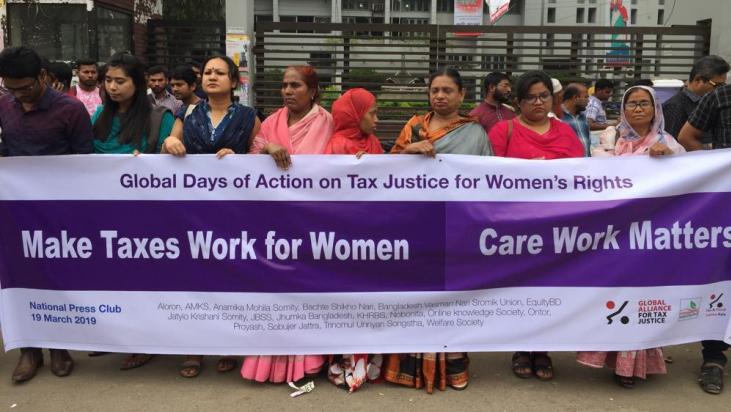In the context of the Global Alliance for Tax Justice’s Global Days of Action to Make Taxes Work for Women, a group of 18 Rights-Based Civil Society networks in Bangladesh participated in a human chain on March 19th, demanding that the tax money to invest for establishing women’s rights. In front of the National Press Club Dhaka, speakers exposed that “Men are enjoying the benefits of food, health, healthcare, education, entertainment and other facilities more than women around the world. Women are prevented from participating in economic activities and discriminated in employment, particularly in recruitment, promotions, wages etc. But the participation of women in both formal and non-formal areas is increasing. On the other hand, the unpaid care work is not counted in the national economy”. Speakers demanded the recognition of women’s contribution in the economy, urged to reduce the burden on women, and demanded redistribution of tax revenue with justice by investing more on women.
The human chain was facilitated by the Bangladeshi organisation EquityBD and included Bangladesh Krishani Shova, Bangladesh Krishak Federation and COAST Trust representatives, demanding:
- inclusion of domestic work contribution in the national economy and GDP,
- stopping the privatization of education, health, water and energy, which create extra burden to the women in families,
- abolition of wage discrimination between men and women,
- investing money in education and women’s skills development,
- removal of value-added tax (VAT) imposition on women-headed families,
- recognition of women’s care work,
- making the tax regime work for women,
- ensuring women-friendly workplaces and provision of daycare centers for children.
- In the written statement, Ms. Rumee of EquityBD said that “women’s participation and contribution in the economy are increasing day by day. However, women’s participation in the formal sector has not improved. About 80 percent of the working people involved in the informal sector are women. Women get less wage and other benefits than men with similar labor. Yet, these women also have to buy essential goods and public services at the same price paid by men, with their less income. Also, women give more time than men in domestic and care work which are not included in the national income, which is valued at about 77 percent of GDP”.
- Ms. Rehana Akter added that “there are no day care centers in several garments factories as well as in government and non-government organizations in the city, except for a few”. She urged the government to increase investment in creating a women-friendly environment and day care centers to promote equality at work.

